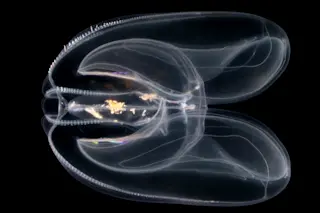About a decade ago, at the request of Psychology Today magazine, I had an amusing debate with Richard Dawkins about testicles. Dawkins had famously proposed the metaphor of the "selfish gene" to explain how traits in organisms can be understood from the imagined point of view of a gene wishing to propagate itself. The underlying logic of the metaphor is compelling, yet it doesn't always seem to work gracefully—as in the case of human male genitalia.
The site of human testicles seems a bizarre anomaly from an evolutionary point of view, like positioning the driver of an armored vehicle in a sack strapped to the bumper. If the whole point of the human organism is to pass on genes, why put the repository of those precious genes out front, in harm's way? Why not protect them the way the brain and the heart are protected, with thick bone vaults and, ...














